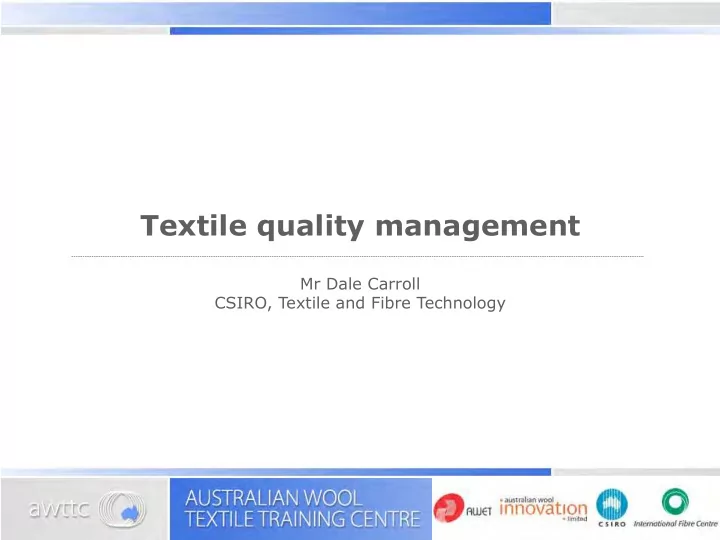

Textile quality management Mr Dale Carroll CSIRO, Textile and Fibre Technology
Textile testing Why do you need to test?
What does testing involve? § Sampling. § Selecting the correct test. § Selecting the most appropriate test method. § Carrying out the test according to the method. § Analysing the results.
Sampling Sampling is the most important step in the testing process. If you don’t get this right, the results mean nothing!
Textile testing laboratories Testing at standard conditions § Consistency in testing. § 20 +/- 2 Deg C § 65 +/- 3 % R. H. § Preconditioning from the dry side. § Condition prior to testing.
Effects of moisture § Natural fibres take up moisture § Tensile properties § Extensibility § Wear properties
Types of tests § Physical § Chemical § Performance § Appearance § Trouble shooting § Dispute resolution
What tests do you use? Pick the test type that meets your requirements § Quality assurance § Quality control § Conformance § Process testing
Specifications Understanding specifications and testing for compliance
Reference: 78/6530 X 30 plain dyed sheet fabric specification PHYSICAL PROPERTY TEST METHOD SPECIFICATION REQUIREMENT Fibre Composition ISO 5088 50% Polyester 50% Cotton Plain Weave Weave Structure BS2861 Warp 20 Tex (30 ECC) Yarn Linear Density ISO 7211.5 Weft 20 Tex (30 ECC) Threads/Unit Length ISO 7211.2 31.0 :t 0.5cm ends 25.5 :t 0.5cm picks Mass/Unit Area ISO 3374 130:t 6g/m Breaking Force ISO 13934.1 250n/50mm min. (warp and weft) Tear Strength ASTM 1424 5.5n min Pilling Resistance IWS 196 3-4 (min) Dimensional Stability ISO 6330/5077 5.0% max Prog 2B (warp and weft) Line dry Colourfastness - to light ISO 105 - B02 5min - to washing ISO 105 - C01/5 Change of Shade 4 Staining 4 - to rubbing ISO 105 - X12 Wet 3-4 Dry 4 - to perspiration ISO 105 - E04 Change of Shade 4 Staining 4
Australian Standards Garment Mark CONTENTS 1. SCOPE 2. MARKING OF PRODUCTS 3. AUTHORIZATION 3.1 GENERAL 3.2 AUTHORIZING BODY 3.3 PROCEDURES FOR AUTHORIZATION 3.4 REGULATIONS FOR THE USE OF THE GARMENTMARK 4. SPECIFICATIONS 4.1 SPECIFICATION NUMBER OOl – SUPPLIER”S QUALITY SYSTEM 4.2 SPECIFICATION NUMBER 002-CARE LABELLING 4.3 SPECIFICATION NUMBER 003-COLOURFASTNESS (INCLUDING TRIMS) 4.4 SPECIFICATION NUMBER 004-DIMENSIONAL CHANGE 4.5 SPECIFICATION NUMBER 005-STRETCH AND RECOVERY PROPERTIES OF FABRICS 4.6 SPECIFICATION NUMBER 006-PILLING OF FABRICS CONTAINING SYNTHETIC POLYMERS OR WOOL 4.7 SPECIFICATION NUMBER 007-STRENGTH PROPERTIES 4.8 SPECIFICATION NUMBER 008-INDUSTRIAL CLOTHING 4.9 SPECIFICATION NUMBER 009-FABRIC MANUFACTURER'S CHECKLIST 4.10 SPECIFICATION NUMBER 01O-GARMENT MANUFACTURER'S CHECKLIST
Who produces test methods? § AS - Australian Standards § ISO – International Standards § ASTM/ AATCC – American Standards § BS – British Standards § EN – European Standards § TWC – The Woolmark Company § IWTO – International Wool Standards § Retailers – e.g. Target, Marks & Spencer § Automotive companies – e.g. Ford, GMH
When do you test? As soon as possible in the production pipeline
Types of testing § Quality assurance Raw material testing Process testing On-the-run improvement In-house tests § Quality control Appraisal testing Conformance testing
Reasons for testing § To verify processing conditions § To verify output § To ensure compliance with specifications § For peace of mind § For research – experimental § For development – improvement
Fibre § Diameter § Length § Strength § Extractable matter § Colour
Sliver/top § Mass/unit length § Evenness § Extractable matter § Fibre bundle strength § Contamination § Neps § Vegetable matter § Coloured fibres
Yarns § Linear density § Strength § Evenness § Twist § Extractable matter § Friction § Hairiness
Woven fabrics § Construction § Tensile strength § Tear strength § Seam strength § Abrasion resistance § Pilling § Stiffness § Tailorability – CSIRO FAST
Knitted fabrics § Construction § Bursting pressure § Pilling § Drape § Air permeability
Fabric testing Dimensional change § Washing – dynamic action § Water – static § Dry cleaning § Steam
Fabric properties § Thermal properties § Moisture vapour resistance § Wicking § Electrostatic propensity § Flammability § Cleanability
Fabric testing Colourfastness testing § Light § Washing § Dry cleaning § Water § Perspiration § Chlorine § Rubbing
Interpreting the results § What the numbers mean § Objective tests § Subjective tests
Confidence limits Does the test result really comply?
Recommend
More recommend